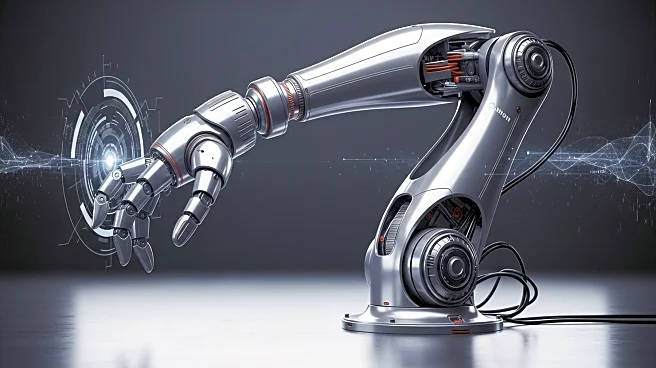What's Happening?
Runway, a New York-based company renowned for its advancements in visual-generating tools, is expanding its technological offerings into the robotics industry. Known for its AI models like Gen-4 and Runway Aleph, which simulate real-world scenarios, the company is now targeting the robotics and self-driving car sectors. This strategic move comes as these industries express interest in using Runway's technology for training simulations. According to Anastasis Germanidis, Runway's co-founder and CTO, the company's models offer a scalable and cost-effective solution for training robotic policies that interact with the real world. This expansion was not initially part of Runway's business plan, but the demand from robotics and self-driving companies has highlighted the broader applicability of their models.
Why It's Important?
The expansion of Runway's AI models into the robotics industry signifies a significant shift in how these technologies can be applied beyond entertainment. By providing a platform for cost-effective and scalable training simulations, Runway is addressing a critical need in the robotics and self-driving car sectors, where real-world training is often expensive and time-consuming. This move could potentially accelerate advancements in these industries, offering companies a way to test and refine their technologies more efficiently. The involvement of major investors like Nvidia, Google, and General Atlantic, who have collectively invested over $500 million, underscores the potential impact and profitability of this expansion.
What's Next?
Runway plans to fine-tune its existing models to better serve the robotics and self-driving car industries, rather than creating a completely separate line of models. The company is also building a dedicated robotics team to support this new direction. As these industries continue to evolve, Runway's technology could play a pivotal role in shaping the future of robotics and autonomous vehicles. The company's approach to simulation and model refinement may set a precedent for other tech companies looking to enter or expand within these fields.
Beyond the Headlines
Runway's expansion into the robotics industry highlights the growing intersection between AI and real-world applications. This development raises questions about the ethical implications of AI in decision-making processes, particularly in autonomous vehicles. As these technologies become more integrated into daily life, the need for robust ethical guidelines and safety standards will become increasingly important. Additionally, the success of Runway's models in these new sectors could influence other AI companies to explore similar cross-industry applications.









